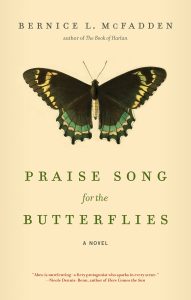Bernice L McFadden: Praise Song for the Butterflies (February 2024)
 The story opens with a little girl, Abeo Kata living a comfortable, happy life in West Africa with her father, Wasik and her mother, Ismae but a series of disasters occur including illness and Wasik’s suspension from his job. This, tragically, coincides with her recently widowed paternal grandmother moving from her village with it’s traditional values and religion into her son and daughter-in-law’s home in the city. She is a domineering matriarch who disapproves of their Christian faith and their modern way of life.
The story opens with a little girl, Abeo Kata living a comfortable, happy life in West Africa with her father, Wasik and her mother, Ismae but a series of disasters occur including illness and Wasik’s suspension from his job. This, tragically, coincides with her recently widowed paternal grandmother moving from her village with it’s traditional values and religion into her son and daughter-in-law’s home in the city. She is a domineering matriarch who disapproves of their Christian faith and their modern way of life.She tells Wasik that his God has not helped him and that their misfortunes all stem from a past transgression commited a member of Ismae’s family for which they are being punished. She browbeats him into thinking that the only way to resolve this is to appease the gods by giving up seven year old Abeo as a virgin slave to a Trokosi shrine.
She also has another agenda. Abeo, though she does not know it, was unofficially adopted and her much-loved free-spirited aunt, Serafina, who lives in America, is her biological mother.
During Serafina’s last visit, Abeo took one of her rings, partly as a keepsake but also as a charm to ensure another visit. When her father hands over to the shrine Abeo, heartbreakingly, tries to make some sense of this unconscionable act by imagining that God is punishing her for the theft.
Abeo endures 14 years as a slave and a sex slave before she is rescued by a couple who run a refuge and by this time she is broken and has lost her sense of who she is particularly after the death by drowning of her baby son. The treatment of the slaves, beatings, rape, starvation rations and back-breaking work resulted in the outlawing of the Trokosi shrines but it still continues and no one is ever prosecuted.
Ismae’s left Wasik when she discovered what he had done but, astonishingly, was persuaded to return and died soon afterwards of a miscarriage, left alone to die by her mother-in-law. Wasik remarried and we do not know if he ever suffered any remorse.
Serafina’s did try to find her daughter but there are so many shrines that her task was impossible.
Abeo went to live in New York where Serafina tried to care for her but was not able to and Abeo was befriended and made a new life.
This was a short book to cover so much in terms of the time span and the very difficult subject matter of abuse and betrayal and recovery. Some of us liked the pared down writing style but most of us would have preferred more depth and character development. We had unanswered questions about efforts to help the shrine slaves and also about Abeo and how she dealt with her anger towards her father.
The dream sequence that book-ended the novel didn’t ring true for us and felt abrupt.
It was interesting to hear Christine Wallach’s talk, ”Now I belong to Me” at our meeting soon after reading this as there were parallels with someone trying to find themselves after being subsumed by an oppressive cult and she expressed so well the difficulties of learning to live independently after escaping, or in her case expulsion, from a sect.
The story in Praise Song for the Butterflies needed to be told and we were left with a desire to learn more about the Trokosi slaves and when, hopefully, they are rescued how they recover from an unimaginable ordeal.
3/5
